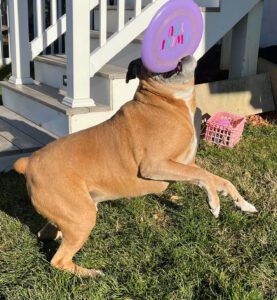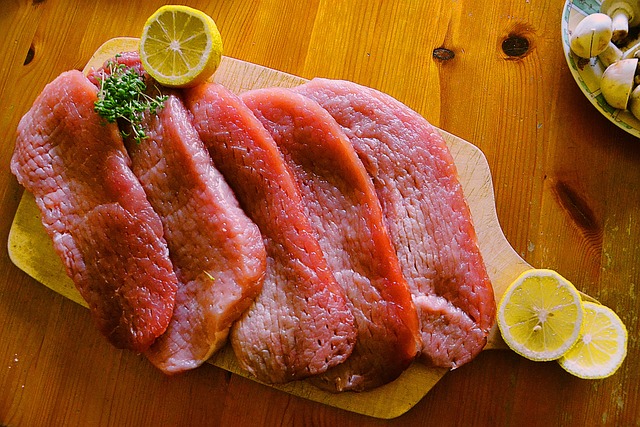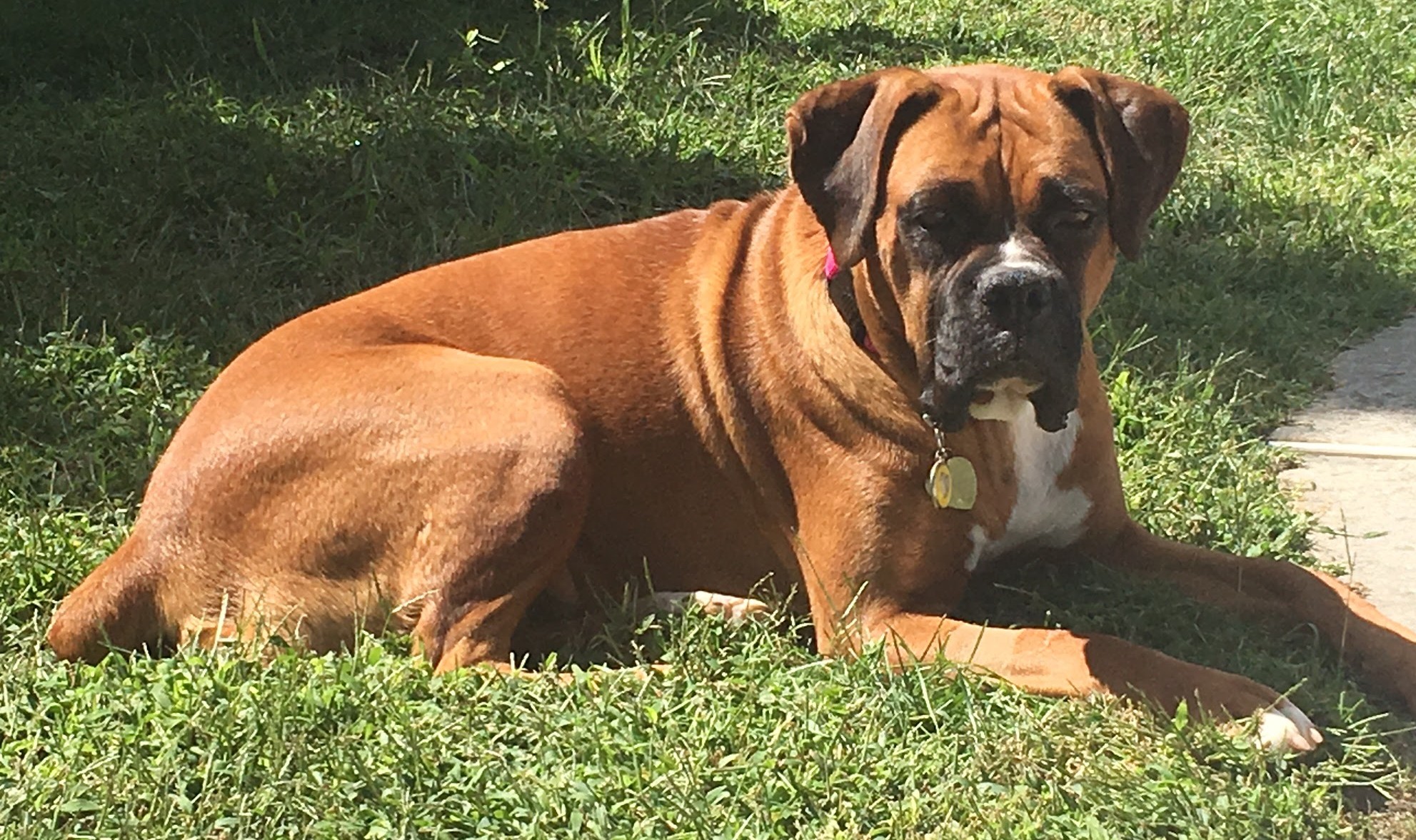This post contains affiliate links. See our Affiliate Disclosure Statement page for more details.
Table of Contents
How Much Should A Boxer Dog Weigh?
How much should a Boxer weigh?
- The average weight of a Male Boxer dog is 72.5 pounds (159.5 kg) with a range from 65 (143 kg) to 80 pounds (176 kg).
- A Female Boxer dog has an average weight of 57.5 pounds (125.4 kg) with an average weight range from 50 (110 kg) to 65 pounds (143 kg).
These weight ranges are averages for a typical Boxer dog. However, there are 5 factors that can directly impact how much Boxer dogs weigh.
5 Factors Affecting How Much a Boxer Weighs
- Exercise
- Nutrition (Caloric Intake)
- Reproductive status – Neutered vs. intact
- Hormonal Conditions
- Genetics
Your Boxer dog’s weight can be affected by a single factor, such as lack of exercise, or can be impacted by multiple factors, such as reproductive status and hormonal conditions.
Boxer dogs are prone to obesity so it is essential to manage the controllable factors above to help keep your Boxer at a healthy weight.
The Association for Pet Obesity Prevention (APOP) conducted a survey in 2018 to determine the extent of obesity in dogs. Based on the data collected via the study, APOP reported that 55.8% of dogs living in the US as overweight.
Table 1 provides Boxer weight guidelines in both pounds and kilograms based on age and gender. The weight ranges are derived from average weights published in veterinary journals.
Table 1 – How Much Should A Boxer Dog Weigh
| Age | Male | Average Weight Male | Female | Average Weight Female |
| 1 month | 5.5 – 9 lbs 12.1 – 19.8 kgs | 7.25 lbs 15.95 kgs | 4.5 – 8 lbs 9.9 – 17.6 kgs | 6.25 lbs 13.75 kgs |
| 2 months | 16-20 lbs 35.2 – 44kg | 18 lbs 39.6 kg | 11 – 17 lbs 24.2 – 37.4 kg | 14 lbs 30.8kgs |
| 3 months | 22 – 26 lbs 48.4 – 57.2 kgs | 24 lbs 52.8 kg | 22 -26 lbs 48.4 – 57.2 kgs | 24 lbs 52.8 kg |
| 4 months | 30 – 35 lbs 66 – 77 kgs | 32.5 lbs | 28 – 30 lbs 61.6 – 66 kgs 71.5 kg | 29 lbs 63.8 kgs |
| 5 months | 35 – 41 lbs 77 – 90.2 kgs | 38 lbs 83.6 kg | 33 -37 lbs 72.6 – 81.4 kgs | 35 lbs 77 kgs |
| 6 months | 41-48 lbs 90.2 – 105.6 | 44.5 lbs 97.9 kg | 39 – 44 lbs 85.8 – 96.8 kgs | 41.5 lbs 91.3 kgs |
| 7 months | 48 – 55 lbs 105.6 – 121 kgs | 51.5 lbs 113.3 kg | 44 – 50 lbs 96.8 – 110 kgs | 47 lbs 103.4 |
| 8 months | 50 – 57 lbs 110 – 125.4 kgs | 53.5 lbs 117.7 kgs | 50 – 52 lbs 110 – 114.4 kgs | 51 lbs 112.2 kgs |
| 9 months | 52 – 61 lbs 114.4 – 134.2 kgs | 56.5 lbs 124.3 kgs | 52 – 59 lbs 114.4 – 129.8 kgs | 55.5 lbs 122.1 kgs |
| 10 months | 55 – 63 lbs 121 – 138.6 kgs | 59 lbs 129.8 kgs | 52 – 59 lbs 114.4 – 129.8 | 55.5 lbs 122.1 kgs |
| 11 months | 57 – 66 lbs 125.4 – 145.2 kg | 61.5 lbs | 52 – 59 lbs 114.4 – 129.8 | 55.5 lbs 122.1 kgs |
| 12 months | 57 – 68 lbs 125.4 – 149.6 kg | 62.5 lbs 125 kgs | 52 – 61 lbs 114.4 – 134.2 kgs | 56.5 lbs 124.3 kgs |
| 18-24 months | 60 – 70 lbs 132 – 154 kgs | 65 lbs 143 kgs | 55 – 63 lbs 121 – 138.6 kg | 59 lbs 129.8 kg |
| 2 – 10 years | 60 – 70 lbs 132 – 154 kgs | 65 lbs 143 kgs | 55 -63 lbs 121 – 139.6 kgs | 59 lbs 129.8 kgs |
For additional information on how much Boxer dogs should weigh, read our article How Much Should I Feed My Boxer Dog? Comprehensive Feeding Chart
How Much Should A Boxer Dog Weigh? 5 Factors Impacting Their Weight
Exercise

Boxer dogs are a high-energy breed that requires a lot of exercise and mental stimulation to keep them from destructive behaviors such as chewing and digging.
It is recommended that Adult Boxers get between 1 to 2 hours of walking on a daily basis. In addition, they should be allowed to run off-leash in a fenced-in or secure area at least two times per week to expend some of their pent-up energy.
A Boxer Health Survey was conducted in 2020 by Boxerbreedcouncil.co.uk that included 3, 969 Boxer dogs. Owners were surveyed about both their Boxer’s activity levels and health status.
The study showed that a vast majority of Boxer owners were prodigy their Boxer dogs with adequate exercise.
- Highly active – 43.8% (1,355 out of 3,093 dogs)
- Moderately Active – 44.1% (1,364 out of 3,093 dogs)
- Mildly Active – 10.9% (336 out of 3,093 dogs)
- Not At All – 1.2% (38 out of 3,093 dogs)
Exercise should include mental stimulation as well since exercise and mental stimulation will keep your Boxer happy and healthy.
Recommended exercises include
- Chasing – Frisbee or throwable object
- Tugging and Pulling – Rope toy
- Jumping – Flirt Pole
- Sniffing – sniff puzzle or puzzle mat
- Agility – Obstacle course or running through tunnels
The products listed below are great options for the recommended exercises listed above. The affiliate links below will provide additional information and pricing on these exercise toys.
Cherrybrook – Chuck It Fumble Fetch
Starmark Treat Ball at Chewy for sniffing and mental stimulation
For additional information on exercise and mental stimulation for your Boxer, read our articles on
- Boxer Dog Exercises – 3 Best Types Of Exercise From Boxer Puppy To Senior Boxer Dog
- 9 Best Ways to Stimulate Your Boxer Dog For A Happy Obedient Companion
- 7 Best Calorie-Burning Exercises for Boxer Dogs And Their Owners
How Much Should A Boxer Dog Weigh? – Nutrition

Boxer dogs can be fed a wide-ranging diet from Kibble to fruits and vegetables to raw food diets. They are prone to both food and skin allergies.
In the Boxer Health Survey 2020 conducted by boxerbreedcouncil.co.uk, Boxer owners reported any Gastrointestinal Issues with their Boxers. Of 2,077 responses, 27.9% of Boxer owners reported gastrointestinal issues with their Boxer. The most common GI issues at 21.4% were food allergies/intolerance.
It is important to be aware of this issue because food allergies and intolerance can impact the weight of your Boxer.
For additional information read our article on 6 Top Foods That Lead To Allergies in Your Boxer Dog.
Boxers are also prone to obesity if their diet and calorie intake are not monitored. It’s important to make sure your Boxer gets plenty of exercise and eats a well-balanced diet. Remember to limit treats because they can add additional calories leading to weight gain.
Read our post on How much should I feed my Boxer dog? Comprehensive Feeding Chart
How Much Should A Boxer Dog Weigh? – Genetics
We can look at our parents and grandparents to help determine how tall we will grow and what our weight might look like.
The same is true for Boxers. The breeder can give you information about the parents to help give perspective on how much should a boxer dog weigh based on the parent’s characteristics.
How Much Should A Boxer Dog Weigh? – Hormonal Conditions
One of the hormonal conditions that cause Boxer dogs to gain weight is Hypothyroidism. This condition occurs when the Thyroid Gland doesn’t produce enough Thyroid hormone which plays a large role in metabolism. Hypothyroidism leads to weight gain and fatigue.
In the Boxer Health Survey 2020, hypothyroidism was reported by 27.8% of the owners who had reported hormonal conditions with their Boxer (30 of 108 respondents)
How Much Should A Boxer Dog Weigh? Neuter Status
Neutered Female Boxers tend to gain weight easily which can lead to obesity and other health problems. It is important to regulate their food intake so they don’t gain too much weight.
Odie Pet Insurance can help you manage your Boxer’s health care costs. Click on the Affiliate link to get coverage and pricing information.
Checkout our plans for DogsHow Much Should A Boxer Dog Weigh? – Summary
How much should a Boxer dog weigh? The literature is consistent on the weight ranges for Male and Female Boxers.
- The average weight of a Male Boxer dog is 72.5 pounds (159.5 kg) with a range from 65 (143 kg) to 80 pounds (176 kg).
- A Female Boxer dog has an average weight of 57.5 pounds (125.4 kg) with an average weight range from 50 (110 kg) to 65 pounds (143 kg).
How much should a Boxer dog weigh is dependent on 5 factors
- Exercise
- Nutrition
- Genetics
- Hormonal disorders
- Reproductive Status
You can help your Boxer maintain a healthy weight by regulating the factors that are controllable. Use the information provided in this article to help your loyal companion maintain a healthy weight.

Discoverboxerdogs.com are Mary and Chris Kustanbauter. We reside in Red Lion, PA with our two Boxers, Duke and Katie, who are both rescue dogs. We have been working with Adopt A Boxer Rescue for the past 17 years and have adopted 5 Boxers from this fine organization. To learn more visit our Home, Boxer Dog Family, and Blogs Pages Visit us on social media on Facebook – Discoverboxerdogs.com, Instagram, and Pinterest.


